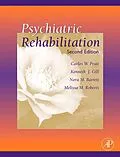Psychiatric rehabilitation refers to community treatment of people with mental disorders. Community treatment has recently become far more widespread due to deinstitutionalization at government facilities. This book is an update of the first edition's discussion of types of mental disorders, including etiology, symptoms, course, and outcome, types of community treatment programs, case management strategies, and vocational and educational rehabilitation. Providing a comprehensive overview of this rapidly growing field, this book is suitable both as a textbook for undergraduate and graduate courses, a training tool for mental health workers, and a reference for academic researchers studying mental health. The book is written in an easy to read, engaging style. Each chapter contains highlighted and defined key terms, focus questions and key topics, a case study example, special sections on controversial issues of treatment or ethics, and other special features.
*New chapters on supported education and integrated dual diagnosis treatment services
*Comprehensive overview of all models and approaches of psychiatric rehabilitation
*Special inserts on Evidence-Based Practices
*New content on Wellness and Recovery
*Class exercises for each chapter
*Profiles of leaders in the field
*Case study examples illustrate chapter points
Autorentext
Nora Barrett is an Associate Professor in the Rutgers Department of Psychiatric Rehabilitation and Counseling Professions and Director of the Bachelor of Science Degree program in Psychiatric Rehabilitation and Psychology. She is responsible for overseeing the program's curriculum and ensuring that it reflects current best practices in the field. She has more than 20 years of experience teaching psychiatric rehabilitation courses. She frequently presents at conferences, provides consultation and training on topics such as individualized recovery planning and ethical practice, and has published a number of articles. She has served on the Board of the United States Psychiatric Rehabilitation Association and its New Jersey affiliate, NJPRA. She is also a founding member of the Consortium of Psychiatric Rehabilitation Educators. She is an active advocate for recovery-oriented services and the credentialing of psychiatric rehabilitation providers. Professor Barrett also worked for more than a decade as a direct practitioner, clinical supervisor and mental health administrator.
Inhalt
Part I: Understanding the Nature of Severe and Persistent Mental Illness
The Experience of Mental Illness: An Introduction to Psychiatric Rehabilitation
Symptoms and Etiology of Severe and Persistent Mental Illness
Course, Outcome, and Treatment of Severe and Persistent Mental Illness
Part II: Psychiatric Rehabilitation Principles and Methodology
Goals, Values and Guiding Principles of Psychiatric Rehabilitation
Psychiatric Rehabilitation Methods
Part III: Applications of Psychiatric Rehabilitation Principles and Methodology
Case Management Strategies
Psychiatric Rehabilitation Day Programming
Vocational and Educational Rehabilitation
Residential Services and Independent Living
Consumers as Advocates and Providers of Supports and Services
The Role of the Family in Psychiatric Rehabilitation
Providing Services to Persons with Severe and Persistent Mental Illness Who are also Chemical Abusers
